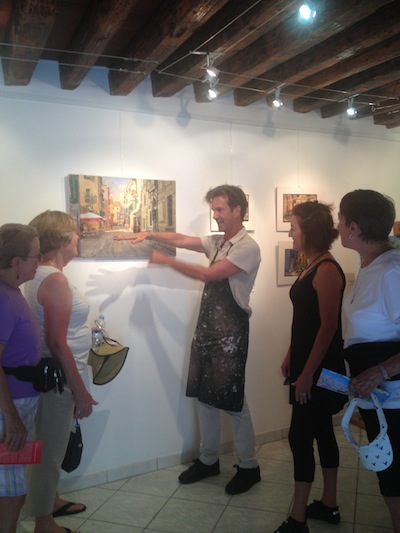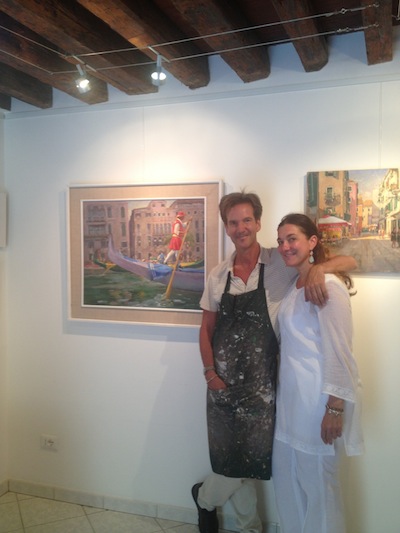I recently met Tony Green while traveling in Italy. He is 59 years old; he lives eight months per year in the Jewish ghetto in Venice. He rents a gallery in Venice where he sells his art. His art is a celebration of life: people dancing and singing in New Orleans and people enjoying life in Venice. In addition to the Venice space, Tony also sells from a gallery in New Orleans, Callan Fine Art, where he is well known for his large murals. While he still loves New Orleans, Tony lives in Venice for the wonderful quality of life there -- the city is without crime and cars; and in it he finds a real sense of community. In Italy, Tony found, people work to live rather than living to work.
Tony had a very interesting road to becoming the entrepreneur he is today. He went to school in New Orleans and then studied in D.C. He also studied for two years in Bruges. When he was 26 years old, he had a life changing opportunity with a Latvian painter Auseklis Ozols who is the founder of New Orleans Academy of Fine Arts. Tony even lived for a year in Accra, Ghana and hitchhiked around West Africa. These are the experiences that led him to becoming an Abstract Impressionist painter.
Tony credits Ozols for teaching him the fundamentals of painting and ultimately, for showing him how to use painting to express his true voice. This mentor taught him the importance of learning human anatomy and he spent years studying that. The mentor taught him composition. where the placement of the colors should be where the forms should be how to show energy. Most importantly, the mentor taught Tony about perspective and guiding the viewer to a particular focal point. He learned to draw first in gray, because with gray you are forced to learn the body and the nuances of what you are trying to express.

Tony Green at his Venice studio with fans from North Carolina.
I was most struck by Tony's commitment to being an honest observer and to raising consciousness. I asked Green to give me some advice about small businesses since he has been a successful artist-entrepreneur for 31 years. Here are his most important points:
1. Create and perfect both your product and your story so you can communicate it to other people.
2. Learn your business markets. He finds his Venice gallery does well in June and September. Location is absolutely important.
Tony's entrepreneurial success is attributed to more than his fascinating background -- his work ethic and work-life balance supports his work and enables him to run two small businesses.
He gets up every morning at 6 am in order to go for a run -- he ran the Venice Marathon. He then spends an hour cleaning up and putting things in order. This leads directly to painting, which for him is putting things in order using colors and honest brush strokes. He works from 10 am to 1 pm, and stops when he is tired. To him, a great painting is a collection of fresh strokes. From 1-3 pm he has lunch.; and from 3-3:30 pm, he takes a nap. In the evenings, he either has dinner with his girlfriend or makes another living as a gypsy jazz guitar player. His work in jazz is based on Jean "Django" Reinhardt, a famous gypsy jazz artist who died in 1953 but is a role model for Tony.

Tony Green and his girlfriend at his studio in Venice.
His favorite artists are John Sargent, Roberto Matta, and George Bellows. He is a wonderful man in that he has always been self-employed, making a living as a working artist in both Venice and New Orleans. I hope Tony's story can inspire other young artists to pursue their own enterprise. His last piece of advice for a young artist is to believe in what you are doing, commit to a work ethic, and get good at small business. Follow a path like Tony's, and you will succeed.
